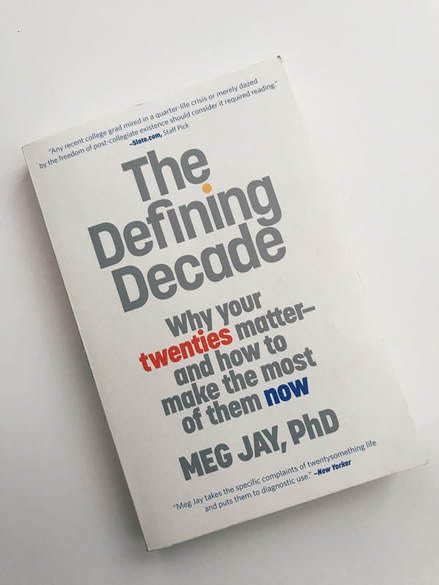Is Passion A Bad Metric for Future Happiness?
“In the end, what matters is your lifestyle. The specifics of your work are important only in how they impact your daily experience.” - Cal Newport
Happy October everyone! I hope you enjoy this week's edition of my newsletter. If you haven't subscribed yet, please be sure to!
🤏 Spread Too Thin?
"In your life, the killer question when deciding what activities to eliminate is: if I didn’t have this opportunity, what would I be willing to do to acquire it?" - Greg McKeown, Essentialism
📚 What I’m Reading Right Now
The Defining Decade by Meg Jay, a clinical psychologist who specializes in helping “twentysomethings.” This is a must read for anyone in their 20’s, and drawing from new research and experiences with her own patients, Jay discusses how to make the most out of what is clearly the most important decade of our lives. For a sneak peak, check out Jay’s TED Talk here.
✍️ Quote of the Week
"It never ceases to amaze me: we all love ourselves more than other people, but care more about their opinion than our own." - Marcus Aurelius, Meditations
Is Passion A Bad Metric for Future Happiness?
Like many college students out there, while I generally know where my interests lie, I don’t know exactly what I want to do in this life. However, I’ve had a lot of fun exploring this topic and have found some great mental models to help me ponder this.
For the first, let’s examine some of the ideas from Cal Newport, an author and professor at Georgetown University.
While we think we might know what we want to do, there actually is no way that we can know if the job we’re after will satisfy us in the long run. This, according to Newport, is because “passion is generated by extended exposure to something that becomes an important part of your life.”
Moreover, college students and recent graduates have not been exposed to any job long enough to know if this job will be fulfilling and will become their “passion.”
While lots of advice says to “follow your passion,” this would actually mean that your long term satisfaction would depend solely on your job. In reality, there are several other aspects of life that are important in being happy and content, including this list that Newport provides:
How much control do I have over my schedule?
What’s the intensity level of my job?
What’s the importance of what I do?
What’s the prestige level?
Where do I live?
What’s my social life like?
What’s my work life balance?
What’s my family like?
How do other people think of me?
What am I known for?
Instead, we should try doing what he calls lifestyle-centric career planning, which is picking the lifestyle you want, and backcasting from that point.
“In the end, what matters is your lifestyle. The specifics of your work are important only in how they impact your daily experience.”
This is profound: by planning around your desired lifestyle, you can eliminate many potential careers without having to be an expert in them. He concludes that, in the end, if you’re living a lifestyle that you love, you might then describe yourself as “passionate.”
My Response
As I think about working in science and the medical field, viewing my career in terms of lifestyle changes some of my thoughts about medicine.
While I understand that there are implicit costs to every career and that there will always be times of imbalance in life, being on call and working night shifts doesn’t sound very appealing!
In fact, I know a doctor who receives a high-speed police escort in the middle of night to go perform life-saving surgery. While his job sounds pretty bad-ass, I think that in the long run this wouldn’t support my ideal lifestyle and could be exhausting.
Addressing the bullet points above, I think my ideal lifestyle would involve the following:
A flexible schedule
An intense, intellectually demanding job where I have the opportunity to fail
Having time for my priorities: my health, family, and friends
Doing work that improves people’s lives in one way or another (”helping people” always sounds so phony)
Interacting with people but also having time for solo study
The ultimate question is, do these criteria end up excluding me from being a doctor? Maybe, but it’s too soon to say.
If you’re a college student reading this, please try writing this out on a piece of paper. You’ll get so much more out of it than just “thinking about it,” because while maybe this article resonated with you, it’s so easy just to jump back into your busy lives full of infinite distractions.
Writing will force you to stop and actually think and reflect on what you truly want. Try it.
Have a great weekend!
Baxter
If you like this article, you should check out this one, where I discuss why work-life balance is a foolish term.
Links to the Articles
Cover Photo by Cullan Smith on Unsplash


